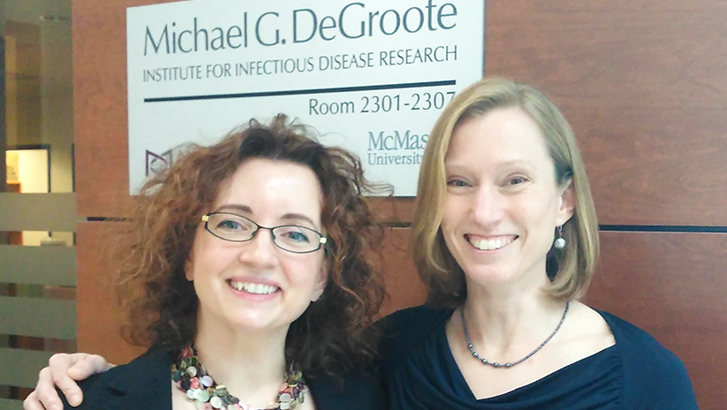Breaking Boundaries: IIDR’s Marie Elliot Nominated by Friend and Colleague, Alba Guarné, for Hamilton Women of Distinction Award

For two scientists at McMaster University, female solidarity has never been so important.
Dr. Marie Elliot, member of the Michael G. DeGroote Institute for Infectious Disease Research and associate professor of biology at McMaster, was recently nominated for a 2017 Hamilton Women of Distinction Award by Alba Guarné, professor of biochemistry and biomedical sciences. Elliot, head of the university’s Elliot Lab, was nominated in the Science, Technology and Trades category.
Now in its 41st year, the event celebrates the remarkable achievements of women in the Hamilton community and raises funds for the YWCA Hamilton. This year’s event will take place on March 9 at the Hamilton Convention Centre.
Guarné, who specializes in understanding how architectural proteins determine the fate of DNA in chromosome replication and repair, won the award last year. Although she was honoured, she was also surprised that there were so few women nominated in the Science, Technology and Trades category.
“Last year, I knew so many women who were deserving of this award,” she explains. “So I made it my mission every year to nominate a female that I know who deserves to be nominated. Marie immediately came to mind for my first nomination.”
The two scientists met at McMaster in 2005 and became fast friends, supporting one another through many challenges, both in their research and in their day-to-day work experiences. “Marie epitomizes a woman of distinction. She is a great scientist and mentor and has done great things in the community,” says Guarné.
Elliot explains her reaction to the nomination from her friend and colleague: “It’s an enormous honour, especially coming from Alba who is such a fantastic role model. Within the university and in Hamilton as a whole there are unbelievably talented women. I was blown away at the nominee reception. There are so many people doing amazing things and I left feeling very inspired. I also tried to figure out what else I can do to contribute in different ways.”
Elliot was recognized for her professional and community contributions. Her research at McMaster focuses on how bacteria grow and communicate with each other and is using this information to find new ways to tackle the antibiotic resistance crisis. She studies Streptomyces to find new antibiotics that can cure multi-drug resistant infections.
She had a chance to combine her scientific expertise and love of running for a non-profit organization called, Fit, Active Beautiful (FAB) Foundation. The foundation aims to eliminate barriers for young girls by providing girls grades six through twelve with the goal-setting and leadership skills necessary to lead an empowered life.
“My friend and running buddy Sharon Gallant is the founder of FAB,” Elliot offers. “She wanted to figure out a way to give back to the community, particularly with a focus on young girls. She thought that by getting girls active, setting goals and using running as a vehicle to do that would be a great strategy. I thought it was an amazing idea and wanted to help. We ran the first pilot project with 9 girls in the east end of Hamilton. It went really well and it has really taken off.”
“I was able to use some of my experience in grant writing to help apply for funding for FAB,” Elliot adds. “I am also able to share research articles about disadvantaged youth and the benefits of exercise. This may be useful in providing evidence that this program works.”
When asked about the advice they would give young women pursuing a career in science, the pair had similar responses.
“Be persistent. Make sure you have people in your corner who will help you and who can provide positive reinforcement. Believe in yourself and your abilities. Also, be active in promoting your work, even if it’s uncomfortable.”
Guarné affirms, “Believe in yourself. Self-doubt can sometimes prevail and that can be very draining. In mentoring students, Marie and I want to shatter barriers and break conceptions that prevent young women from pursuing their skills and dreams.”
Guarné and Elliot have mentored many successful students together but there’s one story that especially stands out to them.
“A third year co-op student wanted to work in my lab because she thought that with being a women, at some point in your career you have to choose either family or profession and she wanted to figure out how I did both,” Guarné explains.
“She was very persistent and she had to learn a lot. She worked on a project in collaboration with Marie. She graduated with a Masters and now she is a PhD student at the University of British Columbia. When she did her Masters defence, a professor on the examining committee asked her what the product of her Masters was. She said, ‘The best product is myself and who I am today.’ This was the young woman who was convinced she could not do it. It was one of the most powerful moments of my career.”
NewsRelated News
News Listing

McMaster Health Sciences ➚
Overcoming resistance: McMaster researchers find new utility for old antibiotics
News
January 6, 2025

December 19, 2024


